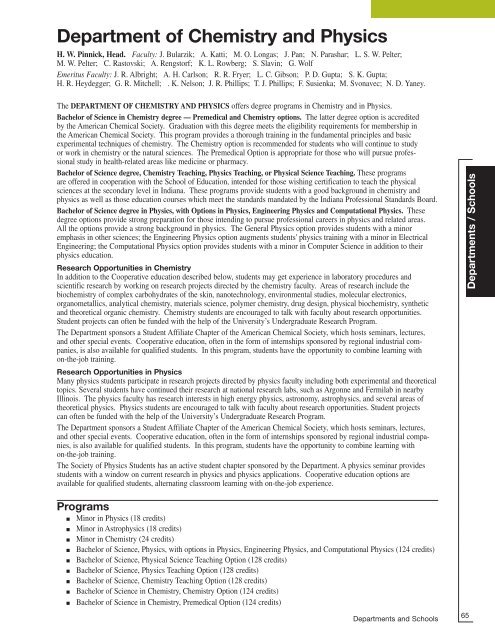ACADEMIC CATALOG - Purdue University Calumet
ACADEMIC CATALOG - Purdue University Calumet
ACADEMIC CATALOG - Purdue University Calumet
You also want an ePaper? Increase the reach of your titles
YUMPU automatically turns print PDFs into web optimized ePapers that Google loves.
Department of Chemistry and Physics<br />
H. W. Pinnick, Head. Faculty: J. Bularzik; A. Katti; M. O. Longas; J. Pan; N. Parashar; L. S. W. Pelter;<br />
M. W. Pelter; C. Rastovski; A. Rengstorf; K. L. Rowberg; S. Slavin; G. Wolf<br />
Emeritus Faculty: J. R. Albright; A. H. Carlson; R. R. Fryer; L. C. Gibson; P. D. Gupta; S. K. Gupta;<br />
H. R. Heydegger; G. R. Mitchell; . K. Nelson; J. R. Phillips; T. J. Phillips; F. Susienka; M. Svonavec; N. D. Yaney.<br />
The DEPARTMENT OF CHEMISTRY AND PHYSICS offers degree programs in Chemistry and in Physics.<br />
Bachelor of Science in Chemistry degree — Premedical and Chemistry options. The latter degree option is accredited<br />
by the American Chemical Society. Graduation with this degree meets the eligibility requirements for membership in<br />
the American Chemical Society. This program provides a thorough training in the fundamental principles and basic<br />
experimental techniques of chemistry. The Chemistry option is recommended for students who will continue to study<br />
or work in chemistry or the natural sciences. The Premedical Option is appropriate for those who will pursue professional<br />
study in health-related areas like medicine or pharmacy.<br />
Bachelor of Science degree, Chemistry Teaching, Physics Teaching, or Physical Science Teaching. These programs<br />
are offered in cooperation with the School of Education, intended for those wishing certification to teach the physical<br />
sciences at the secondary level in Indiana. These programs provide students with a good background in chemistry and<br />
physics as well as those education courses which meet the standards mandated by the Indiana Professional Standards Board.<br />
Bachelor of Science degree in Physics, with Options in Physics, Engineering Physics and Computational Physics. These<br />
degree options provide strong preparation for those intending to pursue professional careers in physics and related areas.<br />
All the options provide a strong background in physics. The General Physics option provides students with a minor<br />
emphasis in other sciences; the Engineering Physics option augments students' physics training with a minor in Electrical<br />
Engineering; the Computational Physics option provides students with a minor in Computer Science in addition to their<br />
physics education.<br />
Research Opportunities in Chemistry<br />
In addition to the Cooperative education described below, students may get experience in laboratory procedures and<br />
scientific research by working on research projects directed by the chemistry faculty. Areas of research include the<br />
biochemistry of complex carbohydrates of the skin, nanotechnology, environmental studies, molecular electronics,<br />
organometallics, analytical chemistry, materials science, polymer chemistry, drug design, physical biochemistry, synthetic<br />
and theoretical organic chemistry. Chemistry students are encouraged to talk with faculty about research opportunities.<br />
Student projects can often be funded with the help of the <strong>University</strong>’s Undergraduate Research Program.<br />
The Department sponsors a Student Affiliate Chapter of the American Chemical Society, which hosts seminars, lectures,<br />
and other special events. Cooperative education, often in the form of internships sponsored by regional industrial companies,<br />
is also available for qualified students. In this program, students have the opportunity to combine learning with<br />
on-the-job training.<br />
Research Opportunities in Physics<br />
Many physics students participate in research projects directed by physics faculty including both experimental and theoretical<br />
topics. Several students have continued their research at national research labs, such as Argonne and Fermilab in nearby<br />
Illinois. The physics faculty has research interests in high energy physics, astronomy, astrophysics, and several areas of<br />
theoretical physics. Physics students are encouraged to talk with faculty about research opportunities. Student projects<br />
can often be funded with the help of the <strong>University</strong>’s Undergraduate Research Program.<br />
The Department sponsors a Student Affiliate Chapter of the American Chemical Society, which hosts seminars, lectures,<br />
and other special events. Cooperative education, often in the form of internships sponsored by regional industrial companies,<br />
is also available for qualified students. In this program, students have the opportunity to combine learning with<br />
on-the-job training.<br />
The Society of Physics Students has an active student chapter sponsored by the Department. A physics seminar provides<br />
students with a window on current research in physics and physics applications. Cooperative education options are<br />
available for qualified students, alternating classroom learning with on-the-job experience.<br />
Departments / Schools<br />
Programs<br />
Minor in Physics (18 credits)<br />
Minor in Astrophysics (18 credits)<br />
Minor in Chemistry (24 credits)<br />
Bachelor of Science, Physics, with options in Physics, Engineering Physics, and Computational Physics (124 credits)<br />
Bachelor of Science, Physical Science Teaching Option (128 credits)<br />
Bachelor of Science, Physics Teaching Option (128 credits)<br />
Bachelor of Science, Chemistry Teaching Option (128 credits)<br />
Bachelor of Science in Chemistry, Chemistry Option (124 credits)<br />
Bachelor of Science in Chemistry, Premedical Option (124 credits)<br />
Departments and Schools<br />
65

















